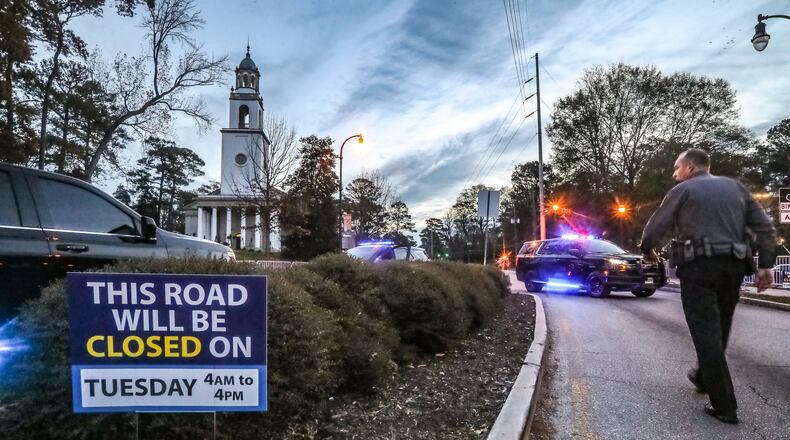One thing they noticed was a stark increase in “grown-ups” on campus on Tuesday, as a couple students put it.
At an Atlanta university largely made up of students in their late teens or twenties, the memorial service for a 96-year-old woman, whom some had heard a bit about, was an oddity. But also, they sensed, one of significance.
They channeled what they had learned in history classes or in public health seminars. Or simply, the wistful thrill their parents or grandparents seemed to get talking about Jimmy and Rosalynn Carter or visiting his presidential library while in town to visit.
“My mom was taught by (Jimmy) Carter,” explained Brielle Angelson, a freshman from New Jersey who stood behind a police barricade to watch the goings on. Her mom had been a student on the same campus about 30 years ago, she said. “I thought it would be pretty cool to send her a picture.”
Tuesday’s memorial service on the edge of Emory University’s campus was a logistical feat to be sure. Plenty of classes were canceled or held remotely. Streets and usual pathways were cordoned off by Secret Service and police and people in fatigues. There were dark limousines and SUVs with tinted windows.
And then there were the famous people the students had heard of. President Joe Biden and first lady Jill Biden. Ex-presidents. Former first ladies. (Michelle Obama was the one who particularly captured their interest, some said.) Georgia’s governor? Atlanta’s mayor? They didn’t really come up in conversation.
And then there were Rosalynn and Jimmy Carter, whose time in the White House was generations removed from the lives of most of Emory’s current undergraduates. Even the couples’ decades of service — they were still building Habitat for Humanity houses just before the pandemic — was a bit of a blur for many of the students.
But the Carters weren’t unknown. Those majoring in political science, international studies and public health had certainly heard something of them. Even among the many students who grew up in other nations.
“I think this is a historical day. Seeing presidents, which is pretty crazy,” said Gustav Matthäi, a 22-year-old political science major from Denmark spending a semester at Emory.
As for Rosalynn Carter, Matthäi added, “I think she is kind of special. She reformed the first lady role” to be more involved in important policy issues. “I think she is pretty cool.”
He skipped the last five minutes of an online class to try to catch the motorcades for the Carter family and others.
Emory has an especially deep connection with the former first couple. It has ties to the Carter Center, with students serving on internships there. And for years, Jimmy Carter spoke at annual town hall meetings, fielding questions submitted in advance by freshmen.
The service at a church on campus wasn’t open to most students. But Emory had the service playing on a TV in a central area of the student center. Most of the students in the cavernous room weren’t watching, though, or were only glancing over at times. There were classes to study for and papers to write, lunches to be eaten.
But some listened in between those other distractions.
Abigail Aronoff learned more about the Carters after coming to Georgia to work on a masters degree in public health. “My parents said they had an amazing legacy.”
Josie Uerling, now working on a masters degree in public health, remembers learning about Rosalynn Carter’s accomplishments and focus on improving mental health care. And Uerling recalled attending a town hall with Jimmy Carter a few years ago.
“All of his answers were so thoughtful and well put together. For somebody in his late 90s, I was so impressed. I was blown away to be in his presence.”
Elise Smith-Davids, a 19-year-old sophomore, knows the names and order of every U.S. president and random facts about them, but she knows a bit more about Carter, given that she is from Atlanta.
She sat in the student center, watching a live feed of the service with Fardeen Kaswar, a sophomore and biophysics major from Arkansas. He came to the student center to grab something to eat — a salmon sandwich. But as he chewed, he listened to Carter’s service.
“The stories people are telling about her are heartwarming,” he said.
He had noticed a change in the campus before the service. “I’ve seen a lot more, I guess, grown-ups here than usual.”
Nearby three students from Brazil peered at their laptops and chatted, but also glanced at the TV and the service for a woman far older than them.
Sofia Barbosa Slivinkis, who came to study for a psychology class, was touched by what she saw, hearing about a former first couple that were “so much more than that.”
“It was a beautiful ceremony,” she said.
About the Author
Keep Reading
The Latest
Featured



